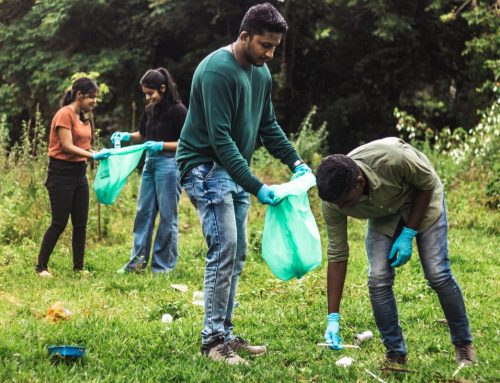In our world today, climate change is a big worry for our future. We see clear signs: temperatures going up, ice melting, and extreme weather happening more often. This global problem affects everyone and everywhere. But in this urgent situation, there’s hope.
Even in this chaos, we have the ability to turn things around. ’50 Ways to Reduce Climate Change’ isn’t just a list of ideas; it’s a plan for making a difference. It shows that small actions, when added up, can create big change.
We reduce as a team
This article isn’t just about what one person can do; it’s a call for all of us to join together. It invites individuals, communities, and countries to work as a team for a better, more eco-friendly future.
Each of these 50 simple ideas helps us become stronger in fighting a big challenge for humanity. It shows that every action, no matter how small, matters in protecting our planet for the future.
But what is climate change really?
Climate change means Earth’s weather patterns changing over a long time. It happens because of things people do and natural changes in the climate. Usually, it’s linked to the Earth getting warmer, but it also affects rainfall, melting ice, rising sea levels, and more extreme weather like droughts, storms, and heatwaves.
Humans, especially by burning fossil fuels (like coal, oil, and gas) for energy, transport, and industry, have released lots of greenhouse gases (such as carbon dioxide and methane) into the air. These gases trap heat from the sun, warming the Earth, and causing climate changes.
Climate change is a big worry because it can affect nature, wildlife, farming, water, people’s health, and the world’s money. Many scientists and groups say it’s urgent to do something. We need to cut down on greenhouse gases and deal with the effects of climate change.

50 Ways to Combat Climate Change:
- Energy-Efficient Appliances: When getting new appliances, choose ones with Energy Star or high energy-efficiency ratings. They use less energy, which saves money and helps the environment.
- Renewable Energy Sources: Choosing renewable energy like solar panels, wind turbines, or geothermal systems isn’t just about powering your home with clean energy. It shows a long-term commitment to using less fossil fuels, cutting down on carbon pollution, and helping make better clean energy technology. Using these sources doesn’t only mean a sustainable energy future but also helps a lot in lessening the bad effects of climate change on our planet.
- Energy Conservation: Simple changes can make a big difference. Like switching off lights when you leave a room, unplugging electronics when you’re not using them (because they still use energy), and using sunlight instead of artificial light whenever you can. These easy steps help save energy and cut down on wasting power. They’re part of the bigger plan to fight climate change and support a greener world.
- Public Transportation & Carpooling: Choosing public transport, sharing rides, biking, or walking isn’t just about what you prefer—it helps cut your carbon footprint. These choices also mean fewer crowded roads, leading to cleaner air and healthier neighborhoods. When people use different ways to get around, they help lower greenhouse gases and create cities that are kinder to the environment. If you want to know more about the most eco-friendly transports, visit our blog.
- Energy-Efficient Vehicles: Pick fuel-efficient or electric cars to fight climate change. These eco-friendly cars help reduce greenhouse gases, keeping the air cleaner and making transportation more sustainable. Using these cars doesn’t just help the environment—it also pushes for innovation in the car industry, aiming for a greener future in transportation.
- Reduce, Reuse, Recycle: Use less packaging, reuse items such as bags and bottles, and recycle materials such as paper, plastic, glass and metal. As well as using reusable products like the Boc’n’Roll and Snack’n’Go, these actions help reduce waste and keep it out of landfills.
- Plant-Based Eating: Eating less meat and dairy not only keeps you healthy but also helps the planet. Choosing more plant-based meals reduces the need for the resource-heavy meat industry and lowers its carbon emissions.
- Local & Seasonal Food: Support local farmers and buy foods that are in season. It cuts down on long-distance food travel and saves energy used to grow out-of-season produce.
- Reduce Food Waste: Plan meals, compost leftovers, and get creative with leftovers. Food waste in landfills makes lots of greenhouse gases, so reducing it is a big step in fighting climate change.
- Water Conservation: Simple habits like fixing leaks, installing low-flow fixtures, and being mindful of water usage significantly reduce water wastage. Conserving water not only helps maintain water supplies but also reduces the energy required for treating and transporting water.
- Tree Planting & Preservation: Supporting tree planting initiatives and protecting forests is crucial as trees absorb carbon dioxide from the atmosphere, helping to mitigate climate change impacts and preserving biodiversity.
- Sustainable Fashion: Embracing eco-friendly and sustainable clothing choices or opting for second-hand apparel plays a crucial role in reducing the environmental impact of the fashion industry. This industry is notorious for its substantial resource consumption and generation of excessive waste. By consciously selecting sustainable clothing options, individuals contribute to minimizing the environmental footprint associated with the production, use, and disposal of garments. This conscious shift towards sustainable fashion promotes ethical manufacturing practices, reduces the strain on natural resources, and fosters a more environmentally responsible approach to personal style.
- Reduce Single-Use Plastic: Minimizing the reliance on single-use plastics through the adoption of reusable alternatives is a pivotal step in combating plastic pollution. Single-use plastics have a detrimental effect on marine life and ecosystems, contributing to widespread environmental degradation. If you know more about the plastic life, visit our blog. Choosing reusable items like water bottles, shopping bags, and containers significantly curtails the volume of plastic waste that ends up in landfills and oceans. This action not only reduces pollution but also raises awareness about the importance of reducing plastic consumption and encourages the adoption of eco-conscious habits.
- Home Insulation: Implementing proper insulation measures in your home holds substantial benefits in reducing unnecessary heating or cooling requirements. Effective insulation significantly decreases energy consumption by maintaining comfortable indoor temperatures without excessive reliance on heating or cooling systems. This practice not only results in reduced energy bills but also contributes to lowering carbon emissions associated with energy production. It ensures more efficient utilization of resources and fosters a more environmentally sustainable approach to managing household energy needs.
- Commuting Alternatives: Considering options such as telecommuting or alternative transportation methods like cycling, walking, or carpooling presents an opportunity to reduce emissions generated during daily commuting. Telecommuting not only minimizes the environmental impact by reducing vehicle emissions but also promotes a healthier work-life balance. Similarly, opting for alternative transportation methods diminishes individual carbon footprints, alleviates traffic congestion, and contributes to cleaner air and healthier urban environments.
- Efficient Water Heating: Choosing energy-efficient water heaters and adopting practices like shorter showers contribute significantly to conserving hot water and reducing overall energy usage. Energy-efficient water heaters consume less energy to provide hot water, resulting in reduced energy consumption and lower utility bills. Adopting habits such as shorter showers or turning off the tap while not in use further aids in conserving water and energy resources. These practices collectively foster a more sustainable approach to water heating, promoting both environmental conservation and cost savings
- Community Engagement: Participate actively in local environmental initiatives, engage in discussions, and advocate for climate-friendly policies. Community engagement fosters a collective effort towards sustainability.
- Waste Minimization: Choose products with minimal packaging, avoid single-use or disposable items, and opt for reusable alternatives to minimize waste generation.
- Educate and Spread Awareness: Educating others about climate change and sustainability practices while promoting eco-friendly habits in your community can create a ripple effect and inspire more people to adopt responsible behaviors.
- Support Renewable Energy Policies: Advocating for policies that promote and incentivize the use of renewable energy sources while reducing reliance on fossil fuels is crucial. By supporting such initiatives, individuals contribute to accelerating the transition towards cleaner and more sustainable energy alternatives on a larger scale. This advocacy extends support to governmental or organizational policies that encourage the adoption of renewable energy technologies, fostering a more environmentally conscious energy landscape and promoting a low-carbon future.
- Carbon Offset Programs: Consider engaging in carbon offset programs or purchasing carbon credits to offset your carbon emissions. These programs facilitate the balancing out of your overall carbon footprint by supporting projects that reduce emissions elsewhere. By investing in carbon offset initiatives, individuals and organizations can counterbalance their unavoidable carbon emissions by funding or participating in projects that aim to sequester carbon dioxide or reduce greenhouse gas emissions, thus aiding in global efforts to mitigate climate change.
- Eco-Friendly Gardening: Embracing natural and organic gardening practices without the use of chemical pesticides or synthetic fertilizers significantly contributes to promoting biodiversity and nurturing a healthier ecosystem. By adopting eco-friendly gardening techniques, individuals cultivate a more sustainable approach to gardening, which enhances soil health, protects pollinators, and reduces harmful impacts on local ecosystems and water sources.
- Green Building Materials: Opting for environmentally friendly materials in construction and renovation activities supports sustainability by reducing the environmental impact associated with building processes. Utilizing green building materials such as recycled or sustainably sourced materials, energy-efficient insulation, and eco-conscious designs contributes to reducing resource consumption, waste generation, and carbon emissions. This choice fosters the creation of more sustainable structures, promoting energy efficiency and environmental responsibility in the construction industry.
- Efficient Water Usage: Implement rainwater harvesting techniques to collect rainwater for non-potable purposes, such as watering gardens or cleaning. This practice reduces reliance on freshwater sources and promotes efficient water use.
- Government Action: Advocate for policymakers and policies aimed at combating climate change and transitioning to sustainable practices. Active citizen engagement can influence governmental decisions towards more sustainable actions.
- Eco-Friendly Cleaning Products: Use environmentally friendly cleaning supplies to minimize the release of harmful chemicals into the environment. These products are safer for ecosystems and waterways.
- Support Renewable Energy Initiatives: Invest in community-based renewable energy projects or support clean energy initiatives. This investment aids in expanding renewable energy infrastructure, further reducing reliance on fossil fuels.
- Energy-Efficient Home Design: Opt for eco-friendly home designs, such as passive solar heating or green roofs, that maximize energy efficiency and reduce overall energy consumption.
- Telecommuting & Remote Work: Encourage telecommuting or remote work options among employees to reduce commuting emissions, ultimately contributing to lowered carbon footprints for individuals and companies alike.
- Avoid Fast Fashion: Choose durable, quality clothing items over the transient trends of fast fashion. This approach promotes a more sustainable fashion industry by reducing demand for disposable clothing and lowering associated environmental impacts.
- Conserve Paper: Minimize paper usage by embracing digital documentation, practicing double-sided printing, and opting for electronic billing and communication. These measures significantly reduce paper consumption and contribute to forest conservation.
- Volunteer for Environmental Causes: Engage with local environmental organizations and participate in initiatives like clean-up drives, tree planting events, or environmental awareness campaigns. Volunteering is an impactful way to contribute to the betterment of the environment.
- Support Regenerative Agriculture: Choose foods produced through regenerative agricultural practices. These methods focus on restoring soil health, sequestering carbon, and improving biodiversity, positively impacting the environment.
- Environmental Advocacy: Advocate for climate action by writing to lawmakers, participating in environmental rallies, or organizing and attending events that raise awareness about pressing environmental issues.
- Renewable Energy Suppliers: Consider selecting electricity suppliers that prioritize renewable energy sources. Opting for clean energy contributes to reducing carbon emissions from electricity generation.
- Conscious Travel: When traveling, choose eco-friendly accommodations, transportation options with lower carbon footprints, and engage in activities that promote environmental conservation and cultural sensitivity.
- Green Banking & Investments: Support banks and investment opportunities that prioritize sustainability and eco-friendly initiatives. These entities often invest in environmentally responsible projects and support green initiatives.
- Carbon Footprint Calculators: Utilize online tools to calculate your carbon footprint. Understanding your individual impact helps identify areas for improvement and guides you in making more informed decisions toward reducing your carbon footprint.
- Support Eco-Friendly Companies: Make a conscious effort to purchase goods and services from companies committed to sustainability. These businesses prioritize environmentally friendly practices, reducing their overall environmental impact.
- Circular Economy: Support businesses that adopt circular economy principles aiming to minimize waste and resource consumption. These practices emphasize reusing, refurbishing, and recycling materials to reduce waste.
- Environmental Education: Educate yourself and others about climate change, environmental issues, and sustainable living practices. Increasing awareness and understanding of these topics fosters a more environmentally conscious society.
- Responsible Electronics Disposal: Dispose of old electronics in an environmentally responsible manner by recycling or donating them. This reduces electronic waste, conserves resources, and minimizes the environmental impact of improper disposal methods.
- Climate-Friendly Landscaping: Opt for native plants and implement sustainable landscaping practices that require less water and maintenance. These practices contribute to water conservation efforts and help reduce greenhouse gas emissions associated with landscaping practices.
- Reducing Junk Mail: Taking steps to minimize paper waste by opting out of unsolicited mail and promotional materials is a proactive measure in reducing unnecessary paper consumption. By actively choosing to reduce the influx of paper-based advertising and unsolicited mail, individuals not only minimize clutter but also contribute to a decrease in overall paper waste. This action aligns with sustainability goals, conserving resources and reducing the environmental impact associated with the production and disposal of paper-based materials.
- Promote Renewable Energy in Communities: Advocating for community-based renewable energy projects or initiatives that promote the adoption of clean and sustainable energy sources at the local level is crucial. By supporting such initiatives, individuals contribute to fostering a more sustainable and resilient community energy landscape. Encouraging the development of community-owned renewable energy projects or advocating for policies that facilitate local renewable energy generation strengthens community resilience, reduces dependence on fossil fuels, and advances the transition towards cleaner and more sustainable energy sources.
- Support Public Transportation Expansion: Encouraging investments aimed at expanding and improving public transportation systems is pivotal in promoting sustainable urban mobility. Enhanced public transportation options not only provide convenient alternatives but also reduce reliance on individual vehicles. This reduction in private vehicle usage leads to decreased carbon emissions, alleviates traffic congestion, and promotes cleaner air in urban areas. Advocating for public transportation expansion initiatives represents a collective effort towards creating more accessible, efficient, and environmentally friendly transportation systems for communities.
- Encourage Others: Share your knowledge and experiences with sustainable living practices. Encouraging friends, family, and peers to adopt eco-friendly habits and behaviors creates a ripple effect and amplifies the impact of sustainable actions.
- Eco-Tourism: Choose eco-friendly tourism options that support local communities and minimize environmental impact. These choices prioritize sustainable practices, preserve natural resources, and contribute positively to local economies.
- Organize or Participate in Environmental Events: Get involved in organizing or participating in local environmental events such as clean-up drives, tree planting initiatives, or educational workshops. Engaging in these activities strengthens community bonds and raises awareness about environmental issues.
- Continued Learning & Adaptation: Stay updated on emerging sustainable practices and innovative technologies. Continuously evolving and adapting to new eco-friendly strategies help in improving and sustaining efforts towards environmental conservation.
Why it’s important to reduce climate change?
Reducing climate change brings numerous substantial benefits to both the planet and life as a whole. These advantages have far-reaching implications for our environment, societies, and future prospects:
- Conservation of natural resources: Decreasing climate change entails a reduced reliance on natural resources like fossil fuels. This strategic shift not only addresses the immediate environmental concerns associated with resource depletion but also safeguards these finite resources for the well-being of future generations.
- Environmental protection: Through the reduction of greenhouse gas emissions and pollution, efforts to combat climate change play a pivotal role in safeguarding the quality of air, water, and soil. This protection fosters healthier ecosystems, preserving biodiversity and securing the fundamental foundations for all life forms.
- Mitigation of extreme climate impacts: Acting to mitigate climate change can substantially curb the frequency and severity of extreme weather phenomena, including storms, heatwaves, droughts, and hurricanes. This mitigation effort is essential in minimizing risks posed to communities and ecosystems, contributing to overall resilience and stability.
- Promotion of economic sustainability: Initiatives aimed at reducing climate change often stimulate innovation and the development of sustainable technologies. These advancements not only contribute to environmental preservation but also open new economic avenues, fostering growth and creating employment opportunities, particularly in renewable energy and energy-efficient sectors.
- Enhanced human health: By reducing air pollution and encouraging healthier lifestyle choices such as utilizing cleaner transportation and reducing reliance on fossil fuels, there is a direct improvement in human health. This shift contributes to mitigating illnesses linked to pollution, thereby enhancing the overall well-being of communities.
- Preservation of ecosystems: Mitigating climate change acts as a crucial safeguard for preserving natural habitats, marine and terrestrial ecosystems, and endangered species. These efforts are integral in promoting the long-term sustainability and diversity of life on Earth, ensuring a harmonious coexistence between humanity and nature.
Let’s fight together
In the fight against climate change, these lifestyle changes show the way to a more environmentally friendly future. Every idea, from using renewable energy to doing green things every day, goes a long way toward lessening the effects of climate change.
From Roll’Eat, we offer you our reusable sandwiches wrappers and reusable snack pouches so that you can stop using disposable wrappings such as silver foil and plastic wrap.
By making sustainability a big deal, doing things responsibly, and supporting eco-friendly rules, we can all make a huge positive difference for the planet.
These solutions aren’t just personal actions; they’re part of a worldwide push for a healthier Earth. Let’s keep working together, following these plans, and encouraging others. Every step we take to fight climate change helps make the future better for everyone.










